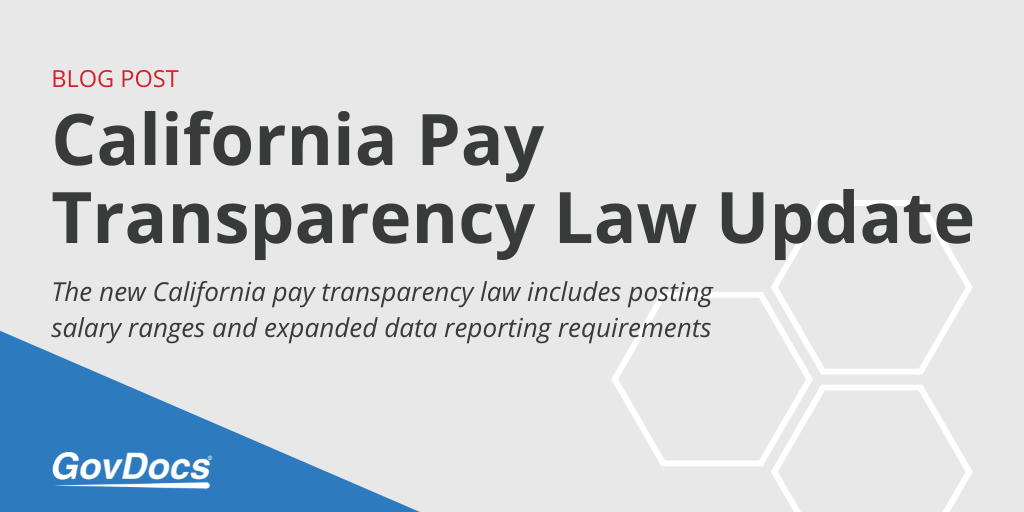EMPLOYMENT LAW NEWS
California Pay Transparency Law Update
By Kris Janisch
Published Oct. 5, 2022

With new pay transparency obligations coming, companies that operate in California should review their policies and procedures, especially as it relates to hiring, recordkeeping and reporting.
A new California pay transparency law was recently signed by Gov. Gavin Newsom.
Broadly speaking, the law, SB1162, requires employers to:
- Make salary ranges for positions available to applicants and employees
- Expand pay data reporting requirements to better identify gender and race-based pay disparities
The governor signed the bill Sept. 27, 2022.
“California has the strongest equal pay laws in the nation, but we’re not letting up on our work to ensure all women in our state are paid their due and treated equally in all spheres of life,” Newsom said in a statement. “These measures bring new transparency to tackle pay gaps, end discriminatory pricing of products based on gender (AB1287) and expand supports for survivors of abuse and assault (AB1467). I thank the Legislative Women’s Caucus for their leadership and partnership in building a more equitable California for all.”
California Pay Transparency Law
California has already previously expanded its pay transparency law. In 2020, the state enacted a measure to identify patterns of wage disparities through mandated statewide pay data reporting.
First, the new law requires employers to make pay scale information available to employees and included in job postings. That portion of the law is effective Jan. 1, 2023. It applies to employers with 15 or more workers.
“Pay scale” means the salary or hourly wage range that the employer reasonably expects to pay for the position.
The law also applies to third parties that post jobs on behalf of the employer.
Reporting Requirements
California’s pay transparency law also further expands state pay data reporting requirements, which include employee sex, race and ethnicity information, to cover contracted employees.
Employers must submit the expanded annual pay data reports that include pay data on employees hired through labor contractors to the California Civil Rights Department starting May 10, 2023, and every second Wednesday in May annually after that point.
That portion of the law applies to employers with 100 or more workers. The reporting will be required by all such employers, regardless of whether they are required to submit EEO-1 reports.
The number of employees by race, ethnicity and sex in several job categories counts workers during a single pay period of the employer’s choice between Oct. 1 and Dec. 31 of the reporting year.
The pay data report must include the number of employees by race, ethnicity, and sex in each of the following job categories:
- Executive or senior level officials and managers
- First or mid-level officials and managers
- Professionals
- Technicians
- Sales workers
- Administrative support workers.
- Craft workers
- Operatives
- Laborers and helpers
- Service workers
Lastly, it’s also worth noting that California has a salary history ban, which bars employers from asking about a job applicant’s
Pay Transparency Laws in the U.S.
As workers and lawmakers continue to push for enhanced employee rights, pay transparency laws are becoming more common.
These laws require employers to be more, well, transparent with salary ranges and benefits. Depending on the jurisdiction, these laws require employers to:
- Provide applicants the salary range for a posted position at a specified point during the hiring process
- Provide employees salary range upon request, when changing jobs, or upon hire
- Include salary range in job postings
Employers should be aware of the pay transparency laws across the U.S., especially with more companies hiring remote workers.
Read more on the topic in a previous Employment Law News blog, Pay Transparency Laws, which also includes information about salary history bans.
Related: California Minimum Wage
Conclusion
Between its multitude of minimum wage rates, various paid leave laws and other employee-friendly legislation, California continues to keep employers on their toes.
And with new pay transparency obligations coming, companies that operate in California should review their policies and procedures, especially as it relates to hiring, recordkeeping and reporting.
This Employment Law News blog is intended for market awareness only, it is not to be used for legal advice or counsel.
Keep Informed
with GovDocs Employment Law News
Who is GovDocs?
GovDocs simplifies employment law compliance for large, multi-jurisdiction employers in the U.S. and Canada. The GovDocs software platform integrates three solutions in one convenient place to help you master the employment laws impacting your business. Whether you manage a postings, minimum wage or paid leave program, our products cut through research time, provide proactive insights into the everchanging landscape of employment laws and reduce the risk of noncompliance. The company is headquartered in Eagan, Minn.
The GovDocs Poster Store simplifies posting compliance for employers with less than 30 locations across all industries, offering a variety of posting products to meet your labor law compliance needs.



